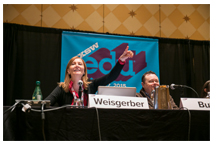In March, Austin hosted the fifth annual SXSWEdu, the education-focused sibling to SXSW’s larger Interactive, Music and Film festivals. SXSWEdu brings together researchers and practitioners to discuss innovative solutions to pressing issues facing higher education as well as K-12.
 St. Edward’s was well represented with faculty presenting in two sessions. Professors Corinne Weisgerber and Shannan Butler provoked one of the more spirited debates at the conference in their session “Disrupting the Disruption in Higher Education”. Click here to follow the twitter conversation their session sparked. David Altounian of the Bill Mundy Business School also led an engaging panel on Entrepreneurship in Education.
St. Edward’s was well represented with faculty presenting in two sessions. Professors Corinne Weisgerber and Shannan Butler provoked one of the more spirited debates at the conference in their session “Disrupting the Disruption in Higher Education”. Click here to follow the twitter conversation their session sparked. David Altounian of the Bill Mundy Business School also led an engaging panel on Entrepreneurship in Education.
Several key themes emerged from the sessions on higher ed curated by SXSWEdu.
-
- Competency-based education is an approach in which students earn credit for coursework based on demonstrating mastery of the course objectives. It’s often self-paced and not contingent on “seat time”.
- Over the next several years, UT will launch 10 competency-based degree programs representing degrees in Engineering, Computer Science, Business, Nursing and Biomedicine.
- Can online/blended delivery address retention and affordability issues for universities?
- What is the role for MOOCs?
- To quote MIT’s Phillip Schmidt: “Judging from MIT’s recent report on the Future of Education at least some of the key people are correctly shifting the focus of discussion from retention to the much more interesting question of how to design good learning experiences. The traditional course model will be only one option in the portfolio of answers.”
- Creativity and student-centered learning
- A number of sessions addressed the topic of personally connecting students to their learning. The conference hosted a wealth of speakers inciting the audience to help students make deeper connections to their learning. A sampling of those sessions included: Stanford’s Transforming Learning Technologies Lab, Austin’s own Sunni Brown and the Doodle Revolution, a Sundance-selected film highlighting innovative educational practices: Most Likely To Succeed, and Guy Kawasaki (formerly of Apple and Google) sharing his lessons learned to future students.
- A number of sessions addressed the topic of personally connecting students to their learning. The conference hosted a wealth of speakers inciting the audience to help students make deeper connections to their learning. A sampling of those sessions included: Stanford’s Transforming Learning Technologies Lab, Austin’s own Sunni Brown and the Doodle Revolution, a Sundance-selected film highlighting innovative educational practices: Most Likely To Succeed, and Guy Kawasaki (formerly of Apple and Google) sharing his lessons learned to future students.
SXSWEdu also featured a startup competition that yielded a few interesting companies. Two companies of note for use in our community are Pear Deck and Zaption. Pear Deck provides an interactive student-resp onse system to support a lecture or presentation. Students can answer questions, draw or annotate within the program and the responses are captured in the tool for quick, informal assessments. Zaption allows faculty to edit together videos (personal videos, youtube content, etc) and add checks for understanding (multiple choice questions, short answer, etc). It’s an interesting idea to use as a formative assessment to pre-assess students’ knowledge of a subject matter.
onse system to support a lecture or presentation. Students can answer questions, draw or annotate within the program and the responses are captured in the tool for quick, informal assessments. Zaption allows faculty to edit together videos (personal videos, youtube content, etc) and add checks for understanding (multiple choice questions, short answer, etc). It’s an interesting idea to use as a formative assessment to pre-assess students’ knowledge of a subject matter.